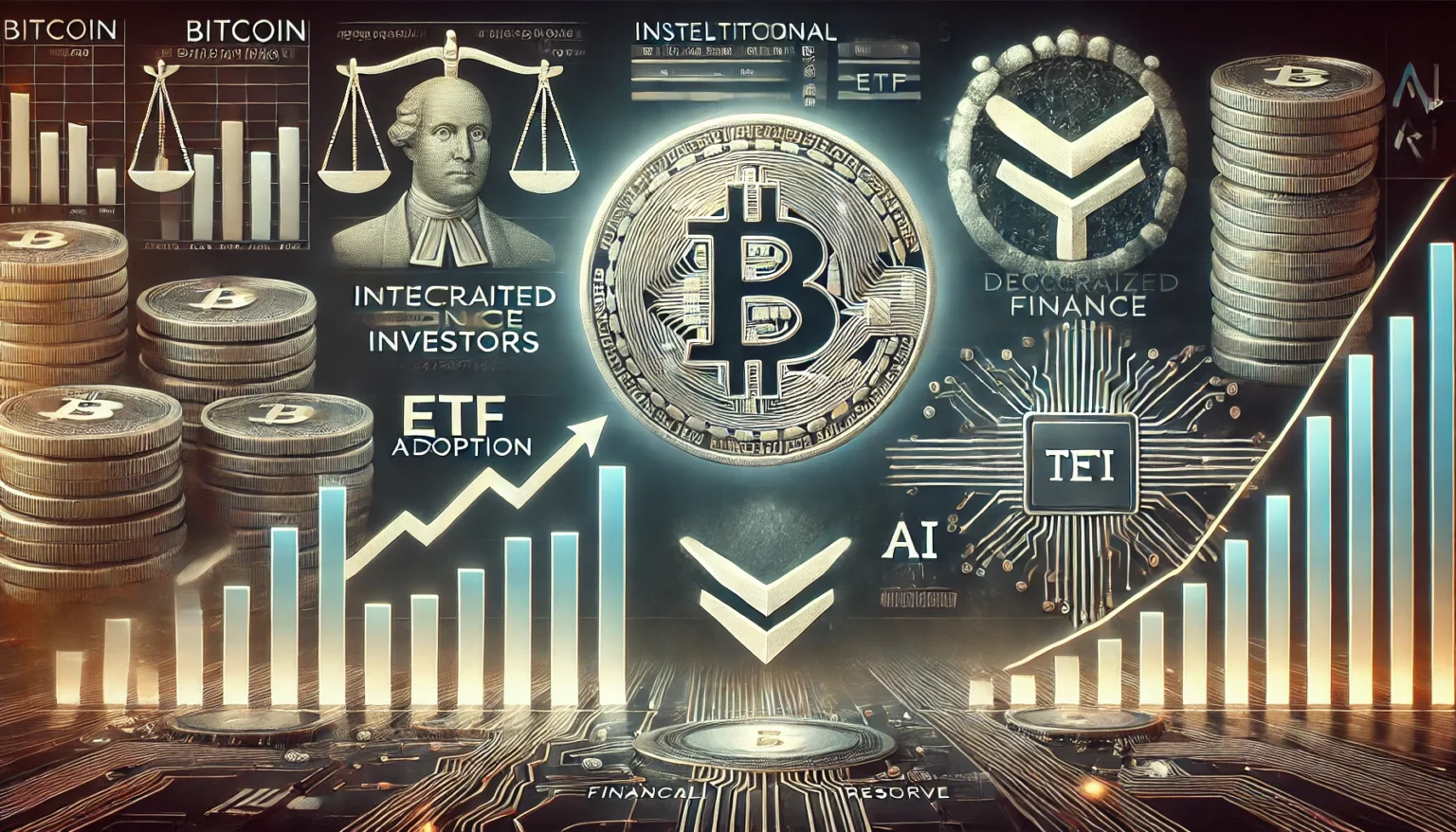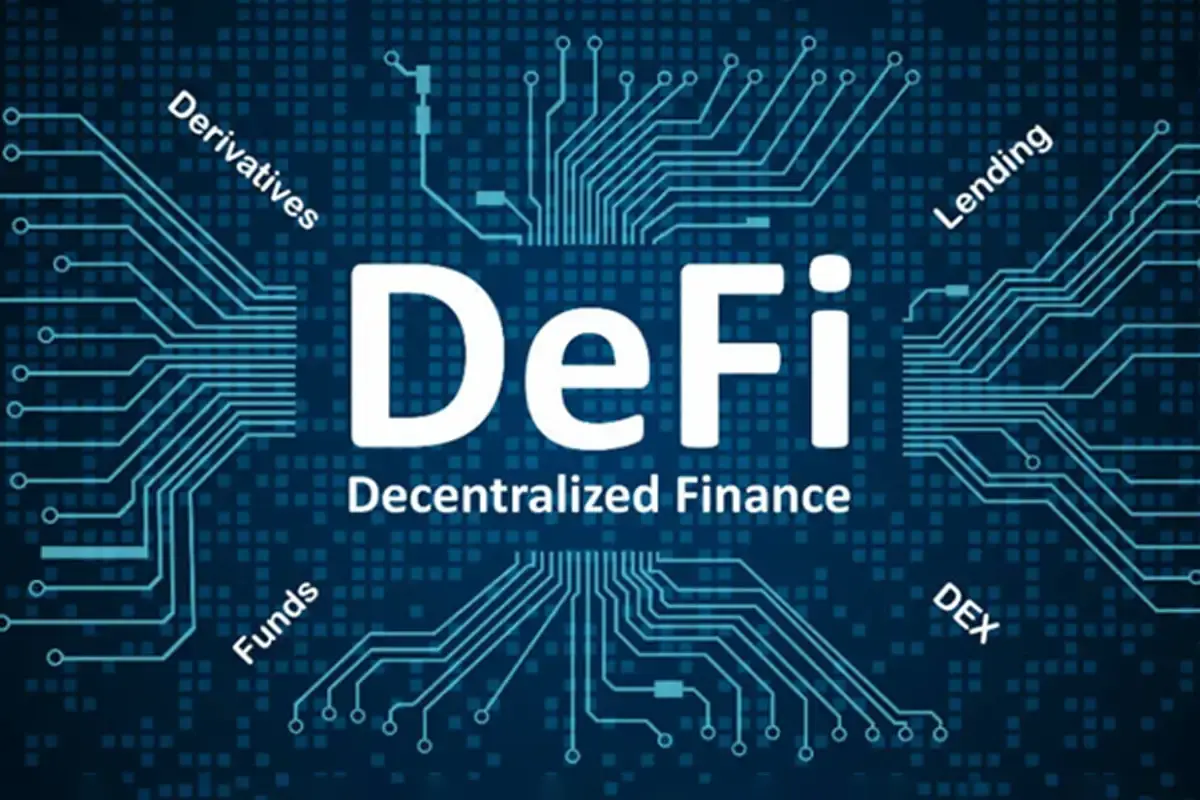کرپٹو مارکیٹ ایک اہم تبدیلی کے عمل سے گزر رہی ہے، جہاں انسٹی ٹیوشنل اڈاپشن، ریگولیٹری چیلنجز، اور ٹیکنالوجیکل ایڈوانسمنٹ اس کے مستقبل کا تعین کر رہے ہیں۔ اسپاٹ بٹ کوائن ETFs کی منظوری ایک بڑی تبدیلی کی علامت ہے، جس نے روایتی انویسٹرز کے لیے کرپٹو کو زیادہ قابل رسائی بنا دیا ہے۔ تاہم، IRS کے نئے رپورٹنگ قوانین جیسے ریگولیٹری اقدامات نے DeFi کمیونٹی میں مزاحمت کو جنم دیا ہے، جو انویشن اور کمپلائنس کے درمیان تنازع کو ظاہر کرتا ہے۔
ساتھ ہی، ٹیتر (USDT) جیسے اسٹیبل کوائنز شفافیت کے مسائل کی وجہ سے دباؤ میں ہیں، جو وسیع تر کرپٹو ایکوسسٹم میں مالیاتی استحکام کے حوالے سے سوالات پیدا کر رہے ہیں۔ AI کرپٹو کرنسیز جیسے ابھرتے ہوئے شعبے بھی مشکلات کا سامنا کر رہے ہیں، جہاں ویلیو میں نمایاں کمی مارکیٹ کی ولٹائلٹی کو ظاہر کرتی ہے۔ اس کے باوجود، 2025 کے آلٹ کوائن سیزن کے لیے امیدیں ان شعبوں میں بحالی اور ترقی کا امکان پیش کرتی ہیں۔
یہ تبدیلی کا دور اس بات کو نمایاں کرتا ہے کہ مارکیٹ کس طرح انویشن، مین اسٹریم اڈاپشن، اور ریگولیٹری فریم ورکس کے درمیان توازن قائم کرنے کی کوشش کر رہی ہے۔ ان پیش رفتوں کے نتائج کرپٹو کا مستقبل طے کریں گے اور انویسٹرز، ڈیولپرز، اور انسٹی ٹیوشنز پر گہرے اثرات ڈالیں گے۔ اس بدلتے ہوئے منظرنامے میں اسٹریٹجک فہم اور لچکدار حل اپنانا انتہائی ضروری ہے۔
بٹ کوائن انسٹی ٹیوشنل اڈاپشن میں اضافہ اور اسپاٹ ای ٹی ایفز کی منظوری
امریکی سیکیورٹیز اینڈ ایکسچینج کمیشن (SEC) نے جنوری 2024 میں اسپاٹ بٹ کوائن ایکسچینج ٹریڈڈ فنڈز (ETFs) کی منظوری دے دی تھی جو کرپٹو مارکیٹ کے لیے ایک سنگ میل ثابت ہوئی۔ ان ETFs نے انسٹی ٹیوشنل انویسٹرز کے لیے بٹ کوائن میں ریگولیٹڈ انویسٹمنٹ کا راستہ ہموار کیا، جس کی بدولت جنوری سے اب تک $18.5 بلین کے فنڈز ان فلو ہوئے۔ ہیج فنڈز جیسے ملینیئم مینجمنٹ اور ٹیودور انویسٹمنٹ نے ان ETFs میں اپنی ہولڈنگز میں نمایاں اضافہ کیا، جس نے ڈیجیٹل ایسٹس پر اعتماد کو مزید مضبوط کیا۔ اس کے نتیجے میں دسمبر 2024 میں بٹ کوائن کی قیمت $100,000 کی نفسیاتی حد عبور کر گئی۔
اسپاٹ بٹ کوائن ETFs کی منظوری نے روایتی انویسٹرز کے لیے بٹ کوائن میں انویسٹمنٹ کو آسان بنا دیا ہے، جس سے مارکیٹ میں شمولیت بڑھی ہے۔ اس نے نہ صرف بٹ کوائن کی قیمت میں اضافہ کیا بلکہ اسے ایک مستند اثاثہ کے طور پر بھی تسلیم دلائی۔ ہیج فنڈز کی جانب سے بڑھتی ہوئی دلچسپی بٹ کوائن کی بطور اسٹور آف ویلیو اور قیاس آرائی کے اثاثے کے طور پر مقبولیت کی نشاندہی کرتی ہے۔ انسٹی ٹیوشنل اڈاپشن بڑے پیمانے پر انویسٹمنٹ کے ذریعے ولٹائلٹی کو کم کرنے میں مددگار ہے۔
مارکیٹ پر اثرات:
بٹ کوائن کی $100,000 کی سطح عبور کرنا انسٹی ٹیوشنل انویسٹرز کی دلچسپی کا عکاس ہے، جو کرپٹو مارکیٹ کے لیے ایک مثبت اشارہ ہے۔ یہ کامیابی دیگر کرپٹو کرنسیز کو بھی فائدہ پہنچا سکتی ہے، خاص طور پر وہ جو بٹ کوائن کی قیمت سے متاثر ہوتی ہیں۔ روایتی فنانس کا کرپٹو انضمام کی جانب بڑھنا ایک لانگ ٹرم تبدیلی کی علامت ہے، جو ڈیجیٹل کرنسیز کو عالمی سطح پر مقبولیت دلانے میں مدد دے گا۔
IRS کے کرپٹو ریگولیشنز اور DeFi کمیونٹی کا ردعمل
امریکی انٹرنل ریونیو سروس (IRS) نے نئی ریگولیشنز متعارف کروائی ہیں، جن کے تحت کرپٹو بروکرز کو صارفین کے ٹرانزیکشنز رپورٹ کرنے کی ہدایت دی گئی ہے۔ یہ قواعد ٹیکس کمپلائنس کو بہتر بنانے کے لیے بنائے گئے ہیں لیکن “بروکرز” کی وسیع تعریف میں ڈی سینٹرلائزڈ ایکسچینجز (DEXs) اور والٹ پرووائیڈرز بھی شامل ہو سکتے ہیں، جن کے پاس صارفین کی معلومات تک رسائی عام طور پر نہیں ہوتی۔ ان قوانین کے خلاف DeFi کمیونٹی نے سخت ردعمل دیا ہے اور IRS اور امریکی ٹریژری ڈیپارٹمنٹ کے خلاف قانونی چارہ جوئی شروع کی ہے، جس کا موقف ہے کہ یہ قوانین ڈی سینٹرلائزڈ پلیٹ فارمز کے لیے ناقابل عمل ہیں اور انویشن کو نقصان پہنچا سکتے ہیں۔
IRS ریگولیشنز کا مقصد کرپٹو ٹیکسز میں بے ضابطگیوں کو ختم کرنا اور مارکیٹ پر بہتر نگرانی قائم کرنا ہے۔ لیکن روایتی کمپلائنس کے اصول ڈی سینٹرلائزڈ سسٹمز پر نافذ کرنا ایک بڑا چیلنج بن سکتا ہے۔ DeFi پلیٹ فارمز، جو اپنی اینونیمٹی اور ڈی سینٹرلائزیشن کے لیے جانے جاتے ہیں، ان قوانین کو پورا کرنے میں مشکلات کا سامنا کریں گے۔ یہ صورتحال نہ صرف DeFi کمیونٹی میں خدشات پیدا کر رہی ہے بلکہ قانونی چیلنجز کے باعث مزید غیر یقینی کی کیفیت پیدا ہو رہی ہے، جو مارکیٹ کی ترقی کو محدود کر سکتی ہے۔
مارکیٹ پر اثرات:
ان ریگولیشنز کے نتیجے میں سرمایہ کاروں اور ڈیولپرز کی توجہ ایسے ممالک کی جانب منتقل ہو سکتی ہے جہاں کرپٹو فرینڈلی قوانین موجود ہیں۔ یہ DeFi کے پروجیکٹس کو امریکی مارکیٹ سے باہر لے جا سکتا ہے، جس سے مارکیٹ میں نقصانات ہو سکتے ہیں۔ اگر یہ قوانین سختی سے نافذ کیے گئے تو یہ ٹوکن کی ویلیو کو متاثر کر سکتے ہیں۔ تاہم، اگر قوانین میں نرمی یا وضاحت آتی ہے، تو یہ طویل مدت میں کرپٹو انویسٹرز کے لیے ایک مثبت قدم ثابت ہو سکتا ہے، کیونکہ یہ کمپلائنس کے خدشات کو کم کر سکتا ہے۔
کرپٹو اسٹاکس میں کمی اور مارکیٹ ولٹائلٹی کا اثر
کرسمس دوران کرپٹو سے وابستہ اسٹاکس میں نمایاں کمی دیکھنے کو ملی، حالانکہ مالیاتی مارکیٹس جیسے S&P 500 نے مثبت کارکردگی دکھائی۔ بٹ کوائن کی قیمت $100,000 کی نفسیاتی حد سے نیچے گرنے کے ساتھ، سائفر مائننگ (Cipher Mining) کے اسٹاک 7.5% کم ہوئے، جبکہ میراتھن ڈیجیٹل (Marathon Digital) میں 6.5% اور کلین اسپارک (CleanSpark) میں 5.8% کی کمی ریکارڈ کی گئی۔ یہ گراؤٹ ظاہر کرتا ہے کہ کرپٹو مارکیٹ کی ولٹائلٹی کس طرح اسٹاکس کو متاثر کرتی ہے۔
کرپٹو ایکوئٹیز کی کارکردگی بٹ کوائن اور دیگر کرپٹو کرنسیز کی قیمتوں سے گہرا تعلق رکھتی ہے۔ جب بٹ کوائن کی قیمت گرتی ہے تو مائننگ اور کرپٹو انفراسٹرکچر کمپنیز کے ریونیو پر براہ راست اثر پڑتا ہے، کیونکہ ان کی پروفیٹ ایبیلٹی بٹ کوائن کی ویلیو سے منسلک ہے۔ اس صورتحال نے یہ ظاہر کیا کہ کرپٹو سے وابستہ اسٹاکس میں سرمایہ کاری کے لیے مارکیٹ کے وسیع حالات کو سمجھنا ضروری ہے۔ یہ کمپنیز خاص طور پر قیمتوں کی تبدیلی کے لیے حساس ہیں، جو ان کے سرمایہ کاروں کو محتاط رویہ اپنانے پر مجبور کرتی ہیں۔
مارکیٹ پر اثرات:
کرپٹو اسٹاکس میں کمی اس بات کی نشاندہی کرتی ہے کہ سرمایہ کار ہائی رسک ایسٹس کے بارے میں محتاط ہیں، خاص طور پر ایسے وقت میں جب مارکیٹ ولٹائل ہو۔ اس کمی سے کرپٹو کمپنیز کی فنڈ ریزنگ یا توسیعی منصوبوں پر اثر پڑ سکتا ہے۔ تاہم، اگر بٹ کوائن کی قیمت جلد دوبارہ بڑھتی ہے، تو ان اسٹاکس کی قدر میں بھی تیزی سے اضافہ ہو سکتا ہے، جو کرپٹو اور ایکوئٹی مارکیٹ کے مابین گہرے تعلق کو ظاہر کرتا ہے۔
ٹیتر کے ریزروز پر دوبارہ خدشات اور FUD کی شدت
ٹیتر (USDT)، جو کہ دنیا کی سب سے بڑی اسٹیبل کوائن ہے، ایک بار پھر الزامات کا سامنا کر رہا ہے کہ اس کے ریزروز USDT ٹوکنز کو مکمل طور پر بیک نہیں کرتے۔ ناقدین کا دعویٰ ہے کہ ٹیتر کے پاس موجود ریزروز اس کے جاری کردہ ٹوکنز کے لیے ناکافی ہو سکتے ہیں، جس سے کمپنی کے سولونٹ ہونے پر سوال اٹھ رہے ہیں۔ ان الزامات کی وجہ سے مارکیٹ میں FUD (Fear, Uncertainty, and Doubt) پیدا ہوا ہے۔ ٹیتر نے ان الزامات کو مسترد کرتے ہوئے کہا ہے کہ اس کے تمام ٹوکنز مکمل طور پر ریزروز سے بیکڈ ہیں، جن میں روایتی کرنسی اور کیش ایکویولنٹس شامل ہیں۔ کمپنی کا کہنا ہے کہ وہ باقاعدہ تھرڈ پارٹی اٹیسٹیشنز کے ذریعے اپنی مالی حیثیت کی تصدیق کرواتی ہے۔
اسٹیبل کوائنز، جیسے ٹیتر، کرپٹو مارکیٹ میں لیکویڈیٹی اور استحکام فراہم کرنے کے لیے اہم ہیں۔ ٹیتر کی مالی حالت پر سوالات نہ صرف خود اسٹیبل کوائن بلکہ وسیع تر کرپٹو مارکیٹ کے لیے خطرہ بن سکتے ہیں۔ اگرچہ ٹیتر کے دعوے کہ اس کے ٹوکنز مکمل طور پر بیکڈ ہیں، مارکیٹ کے کچھ حلقوں کو مطمئن کرتے ہیں، لیکن ناقدین اس بات پر زور دیتے ہیں کہ اٹیسٹیشنز فل آڈٹس کا متبادل نہیں ہیں۔ یہ معاملہ شفافیت کی ضرورت اور کرپٹو مارکیٹ کے اندرونی اعتماد کے مسائل کو اجاگر کرتا ہے۔
مارکیٹ پر اثرات:
اگر ٹیتر اپنی پوزیشن کو واضح طور پر مستحکم کرنے میں ناکام رہتا ہے، تو مارکیٹ میں اس کی اعتماد کھونے کے امکانات ہیں، جس سے سرمایہ کار متبادل اسٹیبل کوائنز جیسے USDC، DAI، یا BUSD کی طرف رجوع کر سکتے ہیں۔ یہ تبدیلی ڈی فائی پلیٹ فارمز کے لیکویڈیٹی پولز کو متاثر کر سکتی ہے اور مرکزی ایکسچینجز کے ٹریڈنگ والیمز میں بھی خلل ڈال سکتی ہے۔ تاہم، اگر ٹیتر ایک جامع آڈٹ پیش کرتا ہے اور الزامات کو مسترد کرتا ہے، تو یہ مارکیٹ میں اپنے غلبے کو برقرار رکھ سکتا ہے اور اعتماد کو بحال کر سکتا ہے۔
AI کرپٹو کرنسیز کی ویلیو میں کمی اور 2025 کے آلٹ کوائن سیزن کی امیدیں
AI کرپٹو ٹوکنز کی مارکیٹ کیپ میں حالیہ مہینوں میں تقریباً 28% کی کمی دیکھنے کو ملی، جو کہ دسمبر 2024 میں $70.4 بلین کی پیک سے کم ہو کر $50.5 بلین تک پہنچ گئی۔ یہ کمی بٹ کوائن کی قیمت میں 14% کی گراوٹ کے ساتھ ہوئی، جس نے $108,000 کی آل ٹائم ہائی کے بعد اپنی ویلیو کھو دی۔ اس کے باوجود، مارکیٹ تجزیہ کاروں کو 2025 کے آغاز میں ایک مضبوط آلٹ کوائن سیزن کی امید ہے، جس میں AI پر مبنی کرپٹو کرنسیز کو دوبارہ ترقی کے مواقع مل سکتے ہیں۔
AI کرپٹو کرنسیز، جو بلاک چین اور مصنوعی ذہانت کے اشتراک سے تیار کی جاتی ہیں، ابھرتے ہوئے شعبے کا حصہ ہیں لیکن مارکیٹ کی ولٹائلٹی سے محفوظ نہیں رہتیں۔ حالیہ کمی اس بات کو ظاہر کرتی ہے کہ یہ ٹوکنز بھی مارکیٹ کے مجموعی رجحانات سے متاثر ہوتے ہیں۔ تجزیہ کاروں کا کہنا ہے کہ تاریخی ڈیٹا کے مطابق، جب بٹ کوائن کی مارکیٹ ڈومیننس کم ہوتی ہے تو سرمایہ کاروں کا رجحان آلٹ کوائنز کی طرف بڑھتا ہے۔ اس دوران، AI ٹوکنز اپنی منفرد ویلیو پروپوزیشن کے ذریعے دوبارہ سرمایہ کاروں کی توجہ حاصل کر سکتے ہیں۔
مارکیٹ پر اثرات:
AI کرپٹو ٹوکنز کی حالیہ گراوٹ نے انویسٹرز میں احتیاط پیدا کی ہے، لیکن آلٹ کوائن سیزن کے آغاز میں ان ٹوکنز کے لیے نئے مواقع پیدا ہو سکتے ہیں۔ اگر مارکیٹ میں رجحانات متوقع طور پر بدلتے ہیں، تو AI بلاک چین ایپلیکیشنز کے لیے انویسٹمنٹ اور انوویشن کے مواقع بڑھ سکتے ہیں۔ تاہم، اگر یہ سیزن توقعات پر پورا نہیں اترتا، تو AI ٹوکنز ممکنہ طور پر مارکیٹ کے زیادہ ولٹائل حصے میں تبدیل ہو سکتے ہیں، جو ان کی لانگ ٹرم کامیابی کے لیے چیلنج ہوگا۔
اہم نکات: کرپٹو مارکیٹ میں حالیہ پیشرفت
- بٹ کوائن کی انسٹی ٹیوشنل اڈاپشن:
- اسپاٹ بٹ کوائن ETFs کی منظوری کے بعد $18.5 بلین کے فنڈز ان فلو ہوئے۔
- بٹ کوائن نے $100,000 کی نفسیاتی حد عبور کی، جو انسٹی ٹیوشنل انویسٹرز کی دلچسپی کا عکاس ہے۔
- IRS ریگولیشنز اور DeFi کا ردعمل:
- IRS کی نئی رپورٹنگ ریگولیشنز نے ڈی سینٹرلائزڈ پلیٹ فارمز کے لیے چیلنجز پیدا کیے ہیں۔
- DeFi کمیونٹی نے ان ریگولیشنز کو ناقابل عمل قرار دیتے ہوئے قانونی چارہ جوئی کا ارادہ کیا ہے۔
- کرپٹو اسٹاکس کی گراوٹ:
- بٹ کوائن کی ولٹائلٹی نے کرپٹو سے جڑے اسٹاکس جیسے Cipher Mining اور Marathon Digital پر دباؤ ڈالا ہے۔
- سرمایہ کاروں میں ہائی رسک ایسٹس کے بارے میں محتاط رویہ دیکھنے کو ملا ہے۔
- ٹیتر پر ریزروز کے حوالے سے خدشات:
- ناقدین نے دوبارہ ٹیتر کے ریزروز پر سوال اٹھائے، جبکہ کمپنی نے انہیں مکمل طور پر بیکڈ قرار دیا۔
- ٹیتر کی شفافیت کے مسائل نے مارکیٹ میں FUD کو جنم دیا۔
-
AI کرپٹو کرنسیز کی کمی اور آلٹ کوائن سیزن:
- AI ٹوکنز کی مارکیٹ کیپ میں 28% کی کمی ہوئی۔
- تجزیہ کاروں کو 2025 میں آلٹ کوائن سیزن کے ذریعے ان کی بحالی کی امید ہے۔







